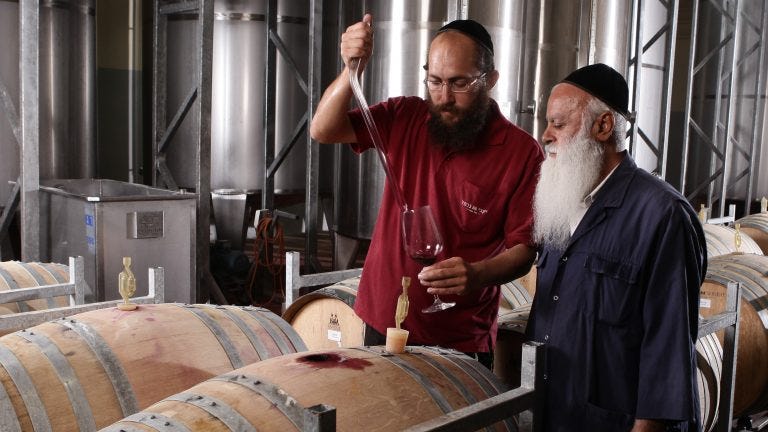The Shmittah Effect
An slightly updated version of one of my articles on a (hopefully) interesting aspect of the Israeli wine scene.
When it comes to Israeli kosher wine, there is one major issue that springs forth every seven years: Shmittah (שמיטה) meaning “to let go” or “release”. The Torah mandates that every seventh year be designated as a rest or sabbatical for the Land of Israel itself, and the land is to lie fallow and agricultural cultivation is forbidden.

Leviticus 25:3–7:
“You may sow your field for six years, and for six years you may prune your vineyard, and gather in its produce. But in the seventh year, the land shall have a complete rest, a Sabbath to the Lord; you shall not sow your field, nor shall you prune your vineyard. You shall not reap the aftergrowth of your harvest, and you shall not pick the grapes you had set aside [for yourself], [for] it shall be a year of rest for the land. And [the produce of] the Sabbath of the land shall be yours to eat for you, for your male and female slaves, and for your hired worker and resident who live with you. And all of its produce may be eaten [also] by your domestic animals and by the beasts that are in your land.”
[See here for the original Hebrew text, or here for the original text with a wealth of rabbinic commentary.]

Just as every seventh day of the week is the Sabbath and is considered holy for the Jewish people, so too every seventh year is the Sabbath for the Biblical Land of Israel, considered holy for the Land itself.
The seventh-year produce is thus imbued with an additional level of holiness known as kedushat shviit (קדושת שביעית), “holiness of the seventh,” because the “seventh” (i.e., the shmittah year) is considered sanctified to God. While it is deemed a privilege to consume produce imbued with kedushat shviit, it is also subject to additional restrictions and regulations (it cannot be wasted, for example).
According to Eli Ben-Zaken, founder and winemaker of Domaine du Castel, “Shmittah is quite a difficult issue for wineries in Israel because it’s obviously not a very economically viable thing to simply stop for the year.”
As Amichai Lourie, winemaker at Shiloh Winery, noted, “Shmittah is a big challenge, and it’s not just me saying it, but also Chazal said it’s a big challenge. They called the people who do observe shmittah properly ‘gibborim’ (גבורים) ‘heroes,’ as it says [in Psalms 103:20], ‘Gibborei koach osei devaro’ (גִּבֹּרֵי כֹחַ, עֹשֵׂי דְבָרוֹ) meaning ‘mighty heroes who do His word’.” [See here for the original text of the Psalm.]
[Two notes here: 1. Chazal (חז״ל) is the Hebrew acronym for ‘Our Sages of Blessed Memory’ (חכמינו זכרונם לברכה) referring to all Jewish sages of the Mishna, Tosefta and Talmudic eras—roughly the last 300 years of the Second Holy Temple in Jerusalem until the 7th century CE, or around 250 BCE – about 625 CE; 2. Lourie’s reference is based upon the Midrash Rabbah, Leviticus 1:1 where the Psalmist’s words are explicitly interpreted as a reference to those who observe Shmittah. See here for the text of Midrash Rabbah.]
The government of Israel also agrees that shmittah is a challenge. As Menahem Hesse, [then] minister of agriculture and science at the Israeli embassy in Washington, put it to me:
“Shmittah is a major issue not just for the State of Israel to manage, obviously, but also for the market and for individual growers, in this case, vineyards and wineries, to manage, to deal with and to plan for — and from the first year, even, not just the seventh year. It is a known, structural element; it’s not coming out of nowhere.”
More broadly, Shmittah is widely understood as both a collective and individual expression of trust in the will of God. There is also an association of higher spirituality, that observance of Shmittah combats our communal and individual materialism and selfishness. Similar to the weekly Sabbath, allowing the land to lay fallow every seventh year is thought to ensure that the land of Israel enjoys a Sabbath of its own.
[NOTE: At this point I thought I should cut in to point out that although I have peppered this with updates, emendations, elucidations, and added some useful hyperlinks, much of this article was originally published back in March 2015 in The Jewish Week’s sadly now defunct “Kosher Wine Guide,” an annual pre-Passover magazine supplement. Reading further, the 2015 date will become more obvious. (FYI, The Jewish Link of NJ has thankfully started publishing something similar). That year, 5775 on the Jewish calendar, was the previous Shmittah year; the current year, 5782 on the Jewish calendar, is also a Shmittah year. I think it holds up pretty well overall.
In the modern era, however, the laws of shmittah are considered by most scholars to be a rabbinic rather than Biblical mandate.
As the12th-Century sage Rabbi Moshe ben Maimon (aka Maimonides) wrote in his monumental work the Mishneh Torah (מִשְׁנֵה תּוֹרָה; “Review of the Torah”), “In the era when the Jubilee year is not observed, none of these mitzvot are observed except the Sabbatical year in Eretz [Yisrael]…according to Rabbinic Law” (see Mishneh Torah, Sefer Zeraim, Shmittah veYovel, 10:9; see also the Babylonian Talmud Arakhin 32b and Gittin 36a). The rabbinic nature of contemporary observance does not, however, mitigate the economic challenge.
“Of course,” said Lourie, “if its d’rabbanan [from the rabbis], so who promises the bracha [blessing]?” The “bracha” here is a reference to the Biblical promise of a special blessing for the observance of shemittah.
“When its d’oraita [from the Torah],” explained Lourie, “it is HaKadosh Barchu [the Holy One Blessed be He] who promises the bracha, but when its d’rabbanan, then HaKadosh Barchu can say to them, ‘it’s not me; the Rabbis told you not to work the field, not me; so go to them if you don’t see the bracha.’…It can be daunting, but I believe everything will be fine, of course.”
Rabbi Dr. Berel Wein, the prolific scholar and public speaker, put it succinctly during a [then recent] lecture on the 2015 Shmittah year:
“This presents an enormous problem. If no agricultural work is done in the Shmittah year, the country will go under, people won’t have what to eat, and the economy will fail, and especially in the hostile environment that we unfortunately live in, we cannot afford such a situation.”
Israel has to not only maintain its agricultural sector and its economic health, but also ensure produce is available for consumers, and keep its defense forces fed. Of course, the Israeli wine industry also needs to continue to quench the collective thirst of the kosher wine consumer.
So, how is this supposed to work, and what does shmittah mean for the Israeli wine industry?
“First,” suggested Adam Montefiore, the [then] wine development director of the Carmel Winery, [then] Israel’s largest wine producer, “a little history is in order to better understand the situation” and get some perspective. “When Baron Edmond de Rothschild planted vineyards and supported the new Jewish farming villages of the late 19th century,” Montefiore noted, he effectively “reintroduced a wine industry in the Holy Land for the first time in 2,000 years.”
[Note: Adam Montefiore, a friend, has long since moved on from Carmel. A veritable institution and legend in the Israeli wine industry, in January he penned his own article on Shmittah which is well worth reading.]
Those pioneer farmers sought to observe the 1889 Shmittah year and so in preparation reached out to Baron Rothschild ahead of time. As Rabbi Wein summarized it, the farmers in effect said to the Baron: “‘you know next year we’re going on vacation, so just send a check.’ The Baron didn’t take kindly to that.”
According to Rabbi Wein, the Baron basically responded with, “‘I can’t believe that they’re not going to work, not going to do anything—and I have to support that?’ And he threatened to end the project completely.” The impending crisis became very clear.
“There were great debates,” said Montefiore, “between those strictly religious who chose to observe the shmittah year exactly as written in the Bible, and those who were less religious, who looked for practical ways to circumvent the ruling, fearing the economic consequences. The debates and arguments continue until today.”

Of course a yid, as the Yiddish saying goes, tut zikh an eytse (אַ ייִד טוט זיך אַן עצה), if there is a kosher way around something, a Jew will find it. This 19th-century crisis in the Holy Land led directly to the then novel rabbinic solution known as heter mechira (היתר המכירה) or “permission to sell”. This entails the temporary sale of Jewish-owned lands in Israel to non-Jews under the supposition that the transfer of ownership removed the prohibitions of shmittah, thereby enabling agricultural activity to continue without restriction. [See here for a contemporary religious explanation and defense of this concept.]
From its inception heter mechira was considered a necessary evil of sorts, was hotly debated, and although still in wide use today, it remains very contentious.
The most popular alternative solution to heter mechira, particularly when it comes to wine production, is known as Otzar Beit Din (אוצר בית דין) or “storehouse operated by a rabbinical court.”
As Ed Salzberg, [then] chief winemaker [now retired] at Barkan Winery, now Israel’s largest producer [note: it was the second largest producer when this was first published], explained, “a beit din [rabbinical court] organizes people to care for the fields, harvest the crops, produce the wine and bottle it. … Halachically there is no buying and selling of fruit or wine here; rather, people [are] being paid by the beit din for their time and effort by people who haven’t the ability to do it themselves.”
“Of course,” Salzberg pointed out, “the people hired by the rabbinical court are the very same grape growers, winemakers and laborers who do the work during the non-shmittah years. So this is a very attractive option for some.” [Note: This year, 2022, the Barkan winery is operating under heter mechira.]
According to Rabbi Dr. Wein, “all of these [options] are loopholes in the law.”
“Heter mechira is a loophole, otzar beis din is a loophole,” explained Rabbi Wein, “but the Torah provides for loopholes because the Torah wants to talk to a society that eventually will reach perfection, but is not there yet, and until you get there, the halacha has to provide for you.”
“Shmittah affects kosher Israeli wineries in many ways,” noted Salzberg, and wineries must choose to either rely upon one of the rabbinic solutions allowing them to work around shmittah, or instead embrace shmittah and simply not work with Israeli produce—to effectively take a break, a sabbatical, if you will.
Additionally, he noted, “this year [2015] a government-sponsored program is being tried where farmers receive a payment from the wineries for not harvesting.”
According to Hesse, the agriculture minister, “about 25 million shekels will go to subsidize those grape growers who will fully observe shmittah. It is not huge compensation, but it helps offset the losses. We also issue guidelines to growers… to help them improve their produce for the future.”
Also, noted Hesse, “the Israel Grape and Wine Council have introduced a new scheme for cooperation between growers and wineries — so that every dunam [unit of land] that will not be cultivated during shmittah will also be compensated in some limited amount by the wineries themselves.” [Note: The Israeli government programs continue apace, and there are private religious charitable foundations offering additional support.]
“The last numbers I heard [back in 2015],” said Victor Schoenfeld, head winemaker of Golan Heights Winery (GHW), “is that some 3,000 acres of Israeli vineyards will be subsidized and not harvested [that year], which is close to a quarter of the total vineyard acreage. In our vineyards, a negligible number of acres are participating in the program.” [I don’t have an update on precise figures today, but gather there has been a sizable increase in shmittah observance for 2022.]
“This [2015] shmittah will be interesting,” says Gabriel Geller, a [then] Jerusalem-based Israeli wine expert and industry consultant, “as it seems that many more wineries than in 2008 [the then previous shmittah year] won’t make any wine at all this time.”
[Note: Gabriel Geller, a friend, has since then immigrated to the US, was hired by the Herzog family’s Royal Wine Corp., and is now their “Director of Public Relations and Advertising” and “Manager of Wine Education”.]
“It might have a positive impact on the industry overall,” mused Geller, “since several wineries are facing difficulties selling their wines and getting rid of their older stocks. Skipping this coming harvest might allow them to focus on selling out the previous vintages.”
Lewis Pasco, winemaker of the Pasco Project and consultant to the Beit El Winery, struck a more sobering note:
“It’s going to be a struggle. … But look, the wine business always has people struggling — a certain percentage of the producers will always be struggling and have cash-flow issues — it’s a tough business to begin with. It’s not like everyone is making a fortune interrupted only by shmittah. The wine business is not a guaranteed thing by any measure, but then that’s not why most of us are in it. That’s not what it’s about.”
While usually the diaspora Jewish communities are a source of support and encouragement for all things Israeli wine, during shmittah things are very different. As GHW’s Schoenfeld lamented, “it seems that the U.S. kosher market is the most reactionary regarding wines in the shmittah year.”
For one thing, the economic argument driving the heter mechira leniency does not apply to the economic realities of American life, so Orthodox kashrus agencies tend towards stringency on the issue.
“Since the different shitot [halachic opinions] are far from achieving consensus on shmittah,” said Gabriel Geller, “the U.S. certifications do not want to take the risk and be seen as too lenient for many of their customers — who wouldn’t touch shmittah wine anyway.”
As Rabbi Aharon Haskel, director of Israel operations for the U.S.-based OK kashrus agency, put it, “Seeking leniencies for shmittah is not our way.”
Further, most rabbinic authorities seem to agree that, as Barkan’s Salzberg succinctly put it, “Sabbatical wines should be consumed [only] in Israel, therefore, there is essentially no export.”
“We miss all the export markets,” agreed Gil Shatsberg, [then] head winemaker of the Recanati Winery, one of Israel’s 10 largest producers. [Note: Gil is still with Recanati, but he’s moved up the company’s ladder and Kobi Arviv is now the head winemaker.]
“The U.S. and France will not take Shmittah wines,” noted Shatsberg, “and usually 20 percent of the Recanati production is for export, so for Shmittah we simply need to prepare with a large enough stock of shanat shishit (שנה שישית; “sixth year” production) to provide into the sabbatical year. So we try to control the economic impact.”
Seemingly alone in the industry, however, the GHW does routinely export its Shmittah wines, and intends to continue do so operating under the Otzar Beit Din approach. Even though the US certification that usually accompanies these wines is dropped from the label for the Shmittah vintages, wines sales seem unaffected.
Justin Kohn, [then] export manager of Tabor Winery, another of Israel’s 10 largest producers, helped put all of this into some perspective.
“Keep in mind,” Kohn said, “that the 2015 shmittah vintage won’t hit the market for some time — at least a year. It is true that Tabor will not be exporting to the U.S., France or the U.K., because our importers there are very strong in the kosher market.”
For Kohn, as for so many others, the key is simply to plan ahead. Indeed, says Kohn confidently, “Shmittah shouldn’t really impact us or our consumers; we simply won’t have the 2015 vintage in that mix.”
As Recanati’s Gil Shatsberg noted, “In general, this is good for the industry and helps some of the players clear out their inventory. It shouldn’t have any real impact on the overall supply and demand.”
Note: There are a plethora of online resources for those seeking actual current religious guidance related to Shmittah; see, for example, Rabbi David Marcus's “Shmittah 5782: A Practical Guide.”]
About me:
By way of background, I have been drinking, writing, consulting, and speaking professionally about kosher wines and spirits for more than 20 years. For over a dozen years I wrote a weekly column on kosher wines and spirits that appeared in several Jewish publications, and my writing generally has appeared in a wide variety of both Jewish and non-Jewish print and online media. A frequent public speaker, I regularly lead tutored tastings and conduct wine and spirits education and appreciation programs. Those interested in contacting me for articles or events can do so at jlondon75@gmail.com.
In what seems like a lifetime ago, I also wrote an entirely unrelated slice of American history: Victory in Tripoli: How America’s War with the Barbary Pirates Established the U.S. Navy and Shaped a Nation (John Wiley & Sons, 2005).
These days I divide my time between London (UK), and Washington, DC.








